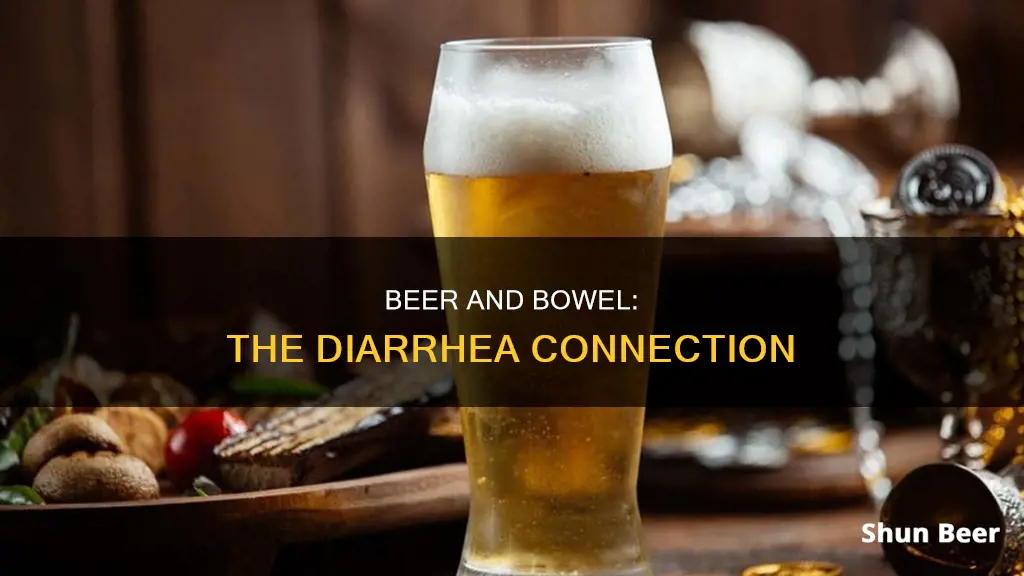
Alcohol is a central nervous system depressant that can have a significant impact on gut health. Drinking beer or any other alcoholic beverage can cause diarrhoea due to several factors, including inflammation, gut bacteria disruption, and reduced water absorption. Alcohol can irritate and damage the stomach lining, causing inflammation and affecting the normal water absorption process in the intestines, which can lead to either constipation or diarrhoea. Additionally, the type of alcohol consumed matters; beverages with lower alcohol concentration, like beer and wine, tend to speed up gastrointestinal tract activity, increasing the likelihood of diarrhoea.
| Characteristics | Values |
|---|---|
| Alcohol content | Alcoholic drinks with lower alcohol content, such as beer and wine, speed up GI tract activity, increasing the chances of diarrhea. |
| Carbohydrates | Alcoholic drinks with high carbohydrate content, such as beer, can be harder to digest, leading to loose stools. |
| Sugar content | Alcoholic drinks with high sugar content can cause an influx of sugar in the digestive tract, leading to an increase in fluids and possibly contributing to loose stools. |
| Gut bacteria | Alcohol can disrupt the balance of gut bacteria, leading to an overgrowth of harmful bacteria and gastrointestinal distress. |
| Water absorption | Alcohol impairs the function of the large intestine and hampers water absorption, leading to diarrhea. |
| Gastric acid | Alcohol increases the production of gastric acid, which can irritate the stomach and exacerbate inflammation. |
| Inflammation | Alcohol can cause inflammation in the lining of the digestive system, leading to rapid digestion and diarrhea. |
| Bowel diseases | People with inflammatory bowel diseases, such as Crohn's disease and ulcerative colitis, are more susceptible to alcohol-induced diarrhea. |
| Irritable Bowel Syndrome (IBS) | Alcohol can worsen IBS symptoms, including abdominal pain, constipation, and diarrhea. |
| Celiac disease | Celiac disease is triggered by gluten, which is commonly found in beer. Alcohol can exacerbate inflammation in the small intestine and worsen symptoms. |
| Sleep | Lack of regular sleep can make the digestive system more sensitive to the effects of alcohol, increasing the risk of diarrhea. |
What You'll Learn

Alcohol and gut inflammation
Alcohol can cause gut inflammation through several mechanisms. Firstly, alcohol can alter the balance of bacteria in the gut, leading to an overgrowth of harmful bacteria and a decrease in beneficial bacteria. This bacterial imbalance can result in gastrointestinal distress and inflammation. Secondly, alcohol can damage the cells lining the digestive system, creating inflammation and lesions. This damage can also increase intestinal permeability, allowing bacteria and toxins to enter the bloodstream and contribute to systemic inflammation. Thirdly, alcohol affects the immune system, decreasing the innate immune response and triggering an inflammatory response, which can further exacerbate gut inflammation. Additionally, alcohol can disrupt the mucus layer that protects the intestinal lining, leading to a "leaky gut". This allows bacteria and toxins to pass through the intestinal barrier and contribute to inflammation throughout the body. Finally, alcohol can affect the metabolism of sugars and the balance of fungi in the gut, leading to overgrowth of yeast and increased gas production, which may also contribute to gut inflammation.
Chronic alcohol consumption is associated with an increased risk of gastrointestinal cancers, including oesophageal, stomach, and colon cancer. Alcohol-induced gut inflammation is believed to be a contributing factor in the development of these cancers. Additionally, alcohol-induced gut inflammation may play a role in the development of inflammatory bowel diseases such as Crohn's disease and ulcerative colitis.
Understanding Beer Staffs: A Guide to Their Functionality
You may want to see also

Alcohol's effect on the large intestine
Alcohol can have a detrimental effect on the large intestine, which is part of the gastrointestinal (GI) tract. The large intestine is where food that is undigested passes from the small intestine to be expelled from the body through the anus.
Alcohol can cause inflammation in the large intestine, which can lead to diarrhoea. This is because alcohol can impair the muscle movement in the large intestine, contributing to the frequent diarrhoea observed in alcoholics. Alcohol can also cause the large intestine to expel liquid more quickly, leading to a runny stool.
Alcohol can also affect the function of the large intestine by inhibiting the absorption of nutrients. Alcohol can interfere with the activity of many enzymes that are essential for intestinal functioning. It can also interfere with the absorption of water, sodium, glucose, and certain amino acids and fatty acids.
In addition, alcohol can cause bacterial overgrowth in the large intestine, which can lead to gastrointestinal distress. Alcohol can cause chemical imbalances in the large intestine, leading to an overproduction of harmful bacteria. The body's mechanism for handling this is to excrete the contents of the large intestine as soon as possible, resulting in diarrhoea.
Chronic alcohol abuse can also lead to gastrointestinal disorders such as irritable bowel syndrome (IBS), which affects the large intestine. IBS is a chronic condition that causes painful contractions, cramping, abdominal pain, gut breath, stomach bloating, constipation, and chronic diarrhoea.
Overall, alcohol can have a negative impact on the large intestine, leading to inflammation, impaired muscle movement, inhibited absorption of nutrients, bacterial overgrowth, and gastrointestinal disorders. These effects can contribute to digestive problems such as diarrhoea, abdominal pain, and malnutrition.
Beer Drinking Champions: Who Consumes the Most?
You may want to see also

Alcohol intolerance
The only way to prevent the uncomfortable reactions caused by alcohol intolerance is to avoid alcohol or limit how much you drink. Over-the-counter or prescription antihistamines may help reduce mild reactions such as itching or hives. However, it is important to note that there is no cure or treatment for alcohol intolerance, and overlooking the symptoms may have severe long-term effects.
In addition to alcohol intolerance, drinking alcohol can also cause diarrhea, especially for people with inflammatory bowel diseases such as irritable bowel syndrome (IBS), Crohn's disease, or Celiac disease. Alcohol can irritate the gut and speed up digestion, leading to diarrhea. It can also affect the way the body absorbs water, resulting in watery stools. Drinking on an empty stomach can further contribute to this.
To prevent alcohol-induced diarrhea, it is recommended to modify drinking habits by either abstaining from alcohol or drinking in low to moderate amounts. Eating before drinking can also help slow the absorption rate of alcohol and aid the digestion process, resulting in thicker bowel movements. Staying hydrated with water or broth is also important, as alcohol can cause dehydration.
Beer Without Refrigeration: Is It Safe to Drink?
You may want to see also

Alcohol and gut bacteria
The gastrointestinal (GI) tract is at particular risk of damage by toxins, and alcohol can overwhelm the GI tract and liver, leading to damage and organ dysfunction. Alcohol and its metabolites promote intestinal inflammation, which in turn exacerbates alcohol-induced organ damage, creating a vicious cycle.
One of the ways alcohol causes intestinal inflammation is by altering intestinal microbiota composition and function, increasing the permeability of the intestinal lining, and affecting the intestinal immune homeostasis. The intestine houses more than 500 bacterial species, and a healthy gut has a balance of "good" and "bad" bacteria. Alcohol can cause an imbalance, known as dysbiosis, which is associated with greater inflammation and disease.
Heavy drinkers with dysbiosis can have "leakier" intestinal linings. A healthy gut lining acts as a barrier between the interior of the intestine, which contains microbes, food, and potentially harmful toxins, and the rest of the body. Alcohol can also impair the function of the large intestine and reduce water absorption, leading to diarrhoea.
In addition, alcohol is packed with sugar, and an influx of sugar into the digestive tract can contribute to loose stools. Alcohol can also affect people with inflammatory bowel diseases, such as Crohn's disease and irritable bowel syndrome (IBS), and trigger a flare-up of symptoms.
To prevent alcohol-induced diarrhoea, it is recommended to modify drinking habits, either by abstaining from alcohol or drinking in low to moderate amounts. It is also important to drink plenty of water to balance out the gastric acid and dilute the alcohol. Eating before drinking can also help slow the absorption rate of alcohol and aid the digestion process, resulting in thicker stools.
Whiskey and Beer: Mixing Alcohol Types Safely
You may want to see also

Preventing alcohol-induced diarrhoea
Alcohol can certainly cause diarrhoea, so it's important to know how to prevent it. Here are some tips to avoid alcohol-induced diarrhoea:
Understand your drink
The amount of alcohol varies between drinks, and the amount you consume plays a key role in digestion and the likelihood of experiencing diarrhoea. Different types of beer, wine, and spirits contain different alcohol levels, so it's important to understand what a standard drink is and how much you are drinking. If you think you may be drinking more alcoholic drinks than normal, you could be experiencing alcohol-related diarrhoea, which is easily fixable by reducing your intake.
Drink water
Drinking water is crucial. Alcohol is a diuretic, which means it encourages the body to lose more water than it takes in, leading to dehydration. By drinking water, you can balance out the gastric acid in the GI tract and dilute the alcohol, keeping your stomach healthy and reducing the severity of a hangover.
Eat before you drink
Drinking on an empty stomach is never a good idea. Eating before drinking alcohol reduces irritation to the stomach and digestive system as there is less direct contact between alcohol and the stomach lining. It also slows the absorption of alcohol, giving your body more time to process it.
Avoid caffeine
Caffeine speeds up your metabolism, which aids quick digestion and often causes loose, watery stools. Avoiding caffeine is an effective way to prevent diarrhoea.
Choose your drinks wisely
Not all alcoholic drinks affect your digestive system in the same way. Drinks with lower alcohol concentrations, like beer and wine, speed up GI tract activity, increasing the chances of diarrhoea. Drinks with higher alcohol concentrations, like vodka and whiskey, slow down GI tract activity.
Eat the right foods
Eating the right foods can help prevent diarrhoea. Bland foods such as bananas, toast, rice, crackers, apples, and applesauce are great for producing solid stools.
Take fibre supplements
If you want to be proactive in preventing alcohol-related diarrhoea, you can try taking soluble fibre supplements. These supplements bind water in the large intestine, helping to prevent or reduce diarrhoea. However, always consult your healthcare provider before taking any supplements.
Beer and Acid Reflux: A Safe Pairing?
You may want to see also
Frequently asked questions
Beer is packed with carbohydrates, which are hard to digest. This means stools may not be fully formed before a bowel movement. Beer also has a lower alcohol concentration, which speeds up GI tract activity and increases the chances of diarrhea.
Alcohol can irritate the stomach lining, leading to inflammation. It can also alter the balance of bacteria in the gut, leading to an overgrowth of harmful bacteria that interfere with the healthy functioning of the digestive system.
Yes, drinking without eating a balanced meal, irregular sleep, and pre-existing gastrointestinal issues can increase the risk of experiencing diarrhea after drinking alcohol.
To prevent diarrhea, it is recommended to drink in moderation, drink plenty of water, eat before drinking, and avoid caffeine.







